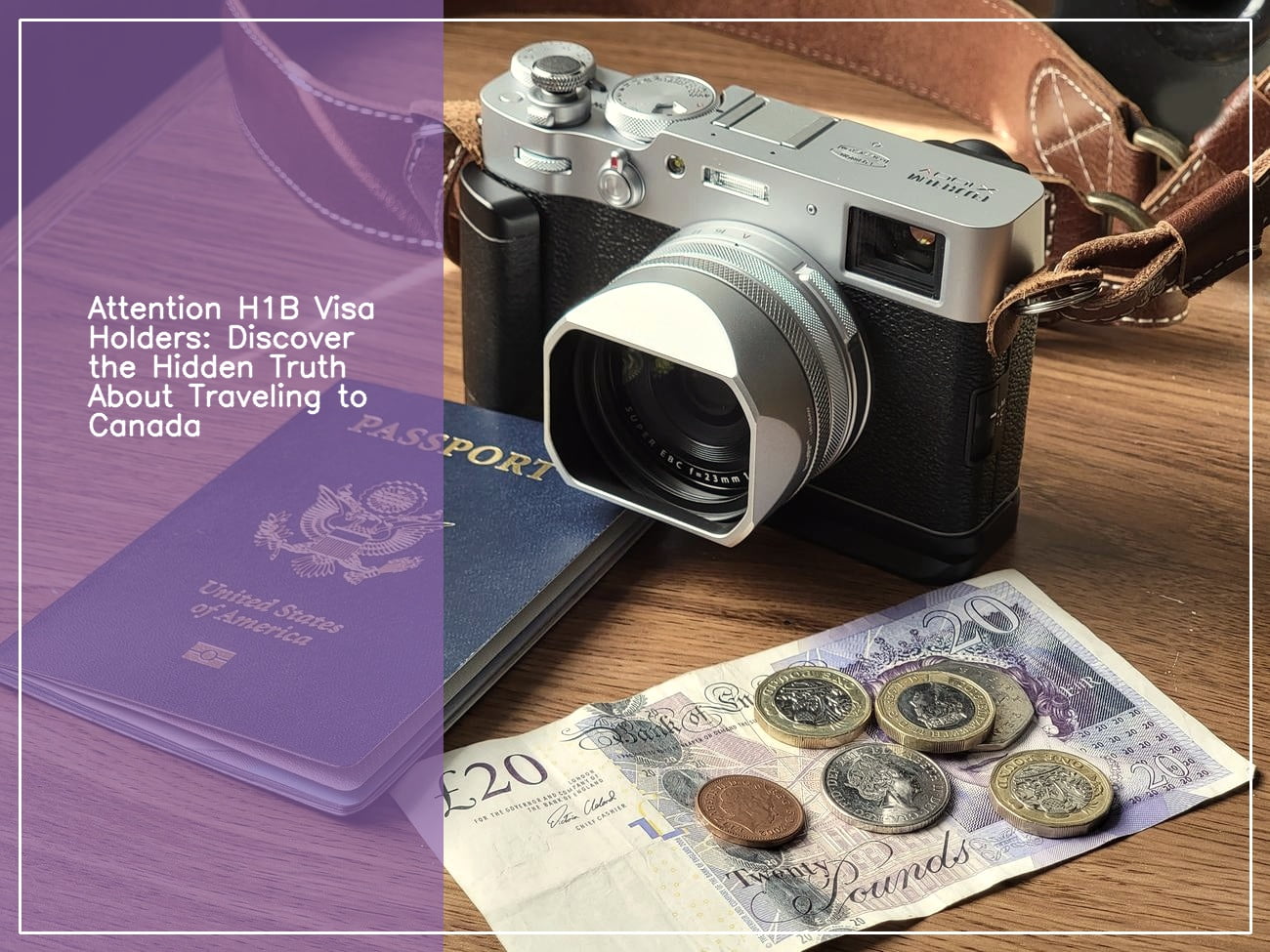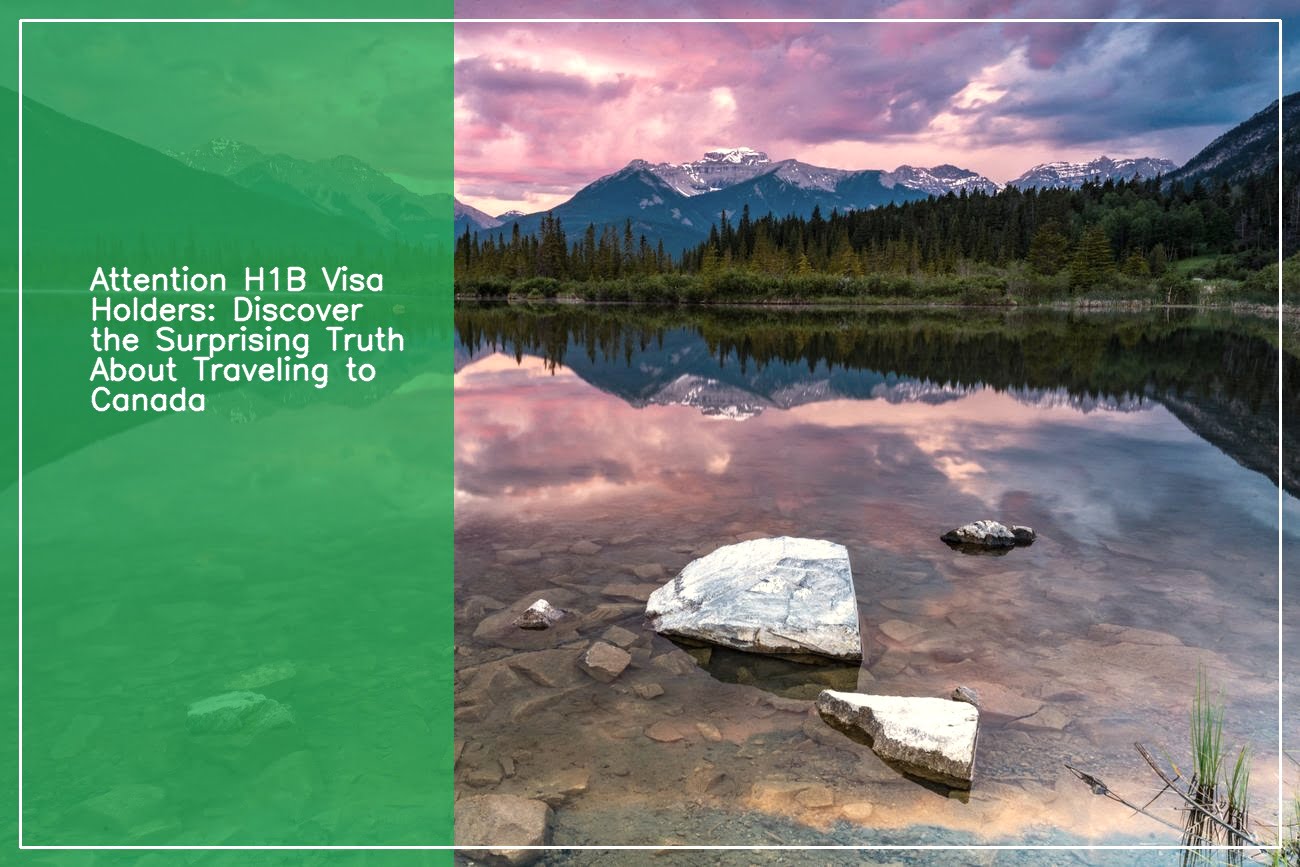Travel restrictions and visa requirements are constantly evolving, making it essential for international professionals to stay informed. In this comprehensive guide, we will delve into the specifics of H1B visa travel to Canada, addressing the requirements, considerations, and essential steps to ensure a smooth journey. Whether you’re a tech expert embarking on a cross-border project or a seasoned traveler seeking clarity, this article titled Can H1B Visa Holders Travel to Canada: Requirements and Considerations will provide you with the insights you need.

Key Takeaways:
- H-1B visa holders in the US can visit Canada.
- Trips shorter than 30 days don’t require an H-1B visa stamped in your passport.
- For longer stays, ensure you have a valid H-1B visa stamp.
- Non-visa-exempt countries need a Canadian visa for entry.
- US green card holders are exempt from Canadian visa requirements.
**Can H1B Visa Holders Travel to Canada: Requirements and Considerations**
Traveling to Canada as an H1B holder? Here’s what you need to know:
Short Trips (Less Than 30 Days)
- Passport Sufficiency: You’re good to go with a valid passport.
- Visa Not Required: Your H1B visa is not required for short visits.
Extended Stays (Longer Than 30 Days)
- Visa Requirement: An H1B visa stamp on your passport is a must.
- Validity Check: Ensure your visa is valid for the duration of your stay.
Non-Visa-Exempt Countries
- Travel Visa: You’ll need a regular Canadian travel visa.
- Check Requirements: Visa requirements vary by country, do your research.
Green Card Holders
- Visa Exemption: Green card holders enjoy visa-free travel to Canada.
- Hassle-Free Entry: Simply present your green card at the border.
Tips for H1B Holders Traveling to Canada
- Advanced Planning: Apply for your visa well before your trip to avoid delays.
- Carry Documentation: Keep your passport, visa, and other relevant documents handy.
- Be Prepared: Be ready to answer questions related to your H1B status.
- Double-Check: Before departure, confirm your visa validity and travel requirements.
Remember: understanding immigration policies can be tricky. If you’re unsure about anything, don’t hesitate to consult an immigration expert.
- You must ready our Cambodia travel tips guide to enjoy your trip to the fullest.
- Are you a DACA recipient willing to travel to the islands of Hawaii? Then, check out here.
- Embark on a guilt-free trip to Mexico by confirming if felons can travel to Mexico here.
- Ever wonder if Guyanese travelers need a visa to visit Canada? Get the answer here.
- Worried about buying travel insurance in a different country? Well, get the facts here.
Applying for a TRV can be done online or through a visa application center.
Navigating immigration policies can be tricky, especially when applying for visas. If you’re a holder of an H-1B visa, you may have questions about traveling to Canada.
This guide is tailored to make the process smoother for you, covering the nuances of H-1B visa requirements and visa application options for Canada.
Application Methods
Online:
- A convenient and efficient option.
- Complete the application form, upload necessary documents, and pay the application fee entirely online.
Visa Application Centre:
- Submit your application in person at a visa application Centre.
- Available in various locations worldwide.
- Requires scheduling an appointment and submitting documents in hard copy.
Key Takeaways:
Online:
- Convenience of completing the entire process online.
- No need for physical document submission or in-person appointments.
Visa Application Centre:
- Personal assistance and guidance in completing the application.
- Suitable for those who prefer in-person support.
Relevant sources:
1. Apply for a Visitor Visa (Temporary Resident Visa – TRV) – IRCC
2. Canada.ca – Visitor visa: Who needs one
Supporting documents such as a valid passport, H-1B visa, and proof of employment in the US are typically needed.
The world of immigration can be a complex one, and understanding the visa rules and regulations can be quite a challenge. H-1B visa holders, who are skilled professionals working in the United States, often find themselves needing to travel internationally for business or personal reasons. Canada, with its proximity and strong ties to the US, is a frequent destination for H-1B holders.
When planning a trip to Canada, H-1B visa holders should be aware of the specific requirements and documents needed to ensure a smooth entry and exist.
Key documents to carry
– A valid passport: Your passport should be valid for at least six months beyond the intended date of departure from Canada.
H-1B visa: You must have a valid H-1B visa stamped on your passport. The visa should be valid for the duration of your intended stay in Canada.
Proof of employment in the US: This can include a letter from your employer stating your job title, salary, and period of employment.
Additional supporting documents: Depending on the purpose of your trip, you may be asked to provide additional documents such as a letter of invitation from a Canadian company, a conference registration confirmation, or proof of funds to support your stay.
Tip
– Always carry a photocopy of your documents. It’s a good idea to keep photocopies of your important documents, including your passport, visa, and employment letter, in a separate location from the originals. This way, if your originals are lost or stolen, you’ll have backups to present to Canadian officials.
- Check the Canadian government website for the most up-to-date requirements.
Key Takeaways:
- H-1B visa holders need a valid passport, H-1B visa, and proof of employment in the US to enter Canada.
- Green card holders can enter Canada visa-free with their green cards.
- Non-visa-exempt countries require a regular Canadian travel visa.
- H-1B holders should apply for a visa well in advance and carry relevant documentation.
- Consulting an immigration expert is recommended if there is any uncertainty about immigration policies.
Sources:
- H-1B Visa Stamping Documents Checklist – Interview, OFC, Vac, Biometrics
- H1B Visa Stamping Dropbox Documents Checklist Eligibility
The processing time for a TRV can vary, and it is recommended to apply well in advance of the intended travel date.
As an H1B visa holder with frequent international travel experience, I’ve encountered many instances where I needed to apply for Temporary Resident Visas (TRVs) to Canada. One crucial aspect I’ve learned is the importance of applying well in advance due to varying processing times.
For example, I once had a business trip to Canada scheduled for a conference, and I applied for my TRV only a few weeks before my intended travel date. Unfortunately, the processing took longer than expected, and I had to reschedule my trip to avoid missing the event.
To ensure a smooth and hassle-free travel experience, consider these insights:
Factors Influencing Processing Time:
Application Completeness: Ensure your application is complete with all required supporting documents at the time of submission to avoid delays caused by requests for additional information.
Application Type: Express Entry applications, which require additional steps and background checks, generally take longer to process compared to standard TRV applications.
Visa Office Workload: Different visa offices may have varying workloads and processing capacities, leading to different processing times.
Peak Seasons: During peak travel seasons, such as summer or holidays, visa offices typically experience higher application volumes, resulting in longer processing times.
Background Checks: In some cases, additional background checks may be required, which can prolong the processing time.
Recommendations for a Smooth Process:
Apply Early: To avoid last-minute surprises or travel disruptions, it’s crucial to apply for your TRV well in advance of your intended travel date. Aim to apply at least two to three months before your trip to allow sufficient time for processing.
Check Processing Times: Before applying, check the current processing times for the visa office responsible for your application. You can find this information on the IRCC website or by contacting the visa office directly.
Online Application: If possible, apply for your TRV online. This streamlined process can expedite the application review and reduce processing times.
Be Prepared: Gather all the necessary documents and information required for your application to avoid delays caused by incomplete submissions.
Track Your Application: Once you submit your application, you can track its status online using the IRCC website or through the IRCC mobile app. This allows you to monitor the progress of your application and stay updated on any developments.
Key Takeaways:
Adequate Time: Apply for your TRV well in advance to avoid the stress of last-minute delays.
Research Processing Times: Stay informed about the current processing times for your specific visa office.
Online Application: Take advantage of the convenience and efficiency of online applications.
Complete Application: Ensure your application is complete and accurate to minimize delays caused by requests for additional information.
Monitor Your Application: Utilize online tracking tools to stay updated on the status of your application.
Citations:
[1] Government of Canada – Processing Times for Temporary Resident Visas (TRVs)
[2] VisaPlace.com – Canada Visa Processing Times

FAQ
Q1: Can H1B holders travel to Canada for short stays?
A1: Yes, H1B visa holders can enter Canada for short trips of less than 30 days without an H-1B visa stamp. Your passport should suffice for entry.
Q2: Do H1B visa holders require a Temporary Resident Visa (TRV) for longer visits to Canada?
A2: Yes, for visits exceeding 30 days, H1B holders need a valid H-1B stamp on their visa to enter Canada.
Q3: What documents are required for an H1B visa holder to apply for a TRV?
A3: The general documents required for a TRV application include a valid passport, digital copies of supporting documents, as well as payment of the application fee using a valid credit card.
Q4: Can dependents of H1B visa holders accompany them to Canada?
A4: Yes, dependents, including spouses and children, can accompany the H1B holder to Canada by obtaining an H4 visa.
Q5: Where can H1B visa holders access information on processing times for Canadian applications?
A5: You can find information about processing times for TRV applications on the official IRCC website:

